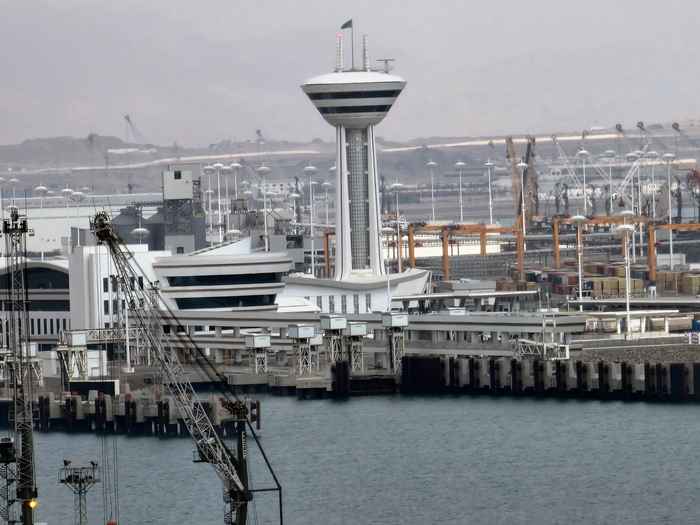The 2nd meeting of the Transport Coordinating Committee of the Organization of Turkic States was held on 25-26 April in Budapest, Hungary. The focus of the delegates’ meeting was on measures to simplify transport and transit operations along the Trans-Caspian International East-West Corridor (Middle Corridor), digitalization of transportation procedures, improvement of multimodal connectivity.
The meeting was attended by the Chairman of the Agency “Turkmendenizderyaellary” (“Turkmen sea and river routes”) Batyr Annaev, who’s presentation was focused on systemic transformations in the transport and logistics sector of Turkmenistan in order to realize the geographical advantages of the country in forming the transit framework of Eurasian supply chains.
A special role belongs to the international seaport of Turkmenbashi, which has the potential to become one of the main logistics centers of the entire Central Asian region. The Turkmenbashi port complex includes ferry, passenger, container, cargo and other terminals, as well as a shipbuilding and ship repair plant.
It plays an important role in the transit system of Central Asia, being a link in the East-West corridor. With a capacity of 17 million tons per year, the port is able to handle the entire range of goods in demand in the region. Regular cargo transportation is carried out on the route Turkmenbashi – ports of the Caspian states.
Geopolitical events and volatile markets for traditional Central Asian exports (fertilizers, chemicals, and petroleum products) are reshaping cargo transportation routes.
Three main routes are emerging for Asian and Chinese goods reaching Europe: the Northern Route (via Russia), the Middle Corridor (Turkmenistan-Azerbaijan-Georgia-Europe), the Southern Route (via the Red Sea). Early 2024 saw political events in the Red Sea region and elsewhere significantly increase shipping costs to Europe. This has driven up the importance of the Middle Corridor, connecting the Caspian and Black Seas. Increased collaboration among participating countries in developing this corridor offers promising new opportunities, stressed Batyr Annayev.
He noted that Turkmenistan is taking active steps to increase traffic through the Turkmenbashi port. Various measures to stimulate transit are being considered, including the provision of benefits for port fees and discounts on sea transportation. Regular ferries run between Turkmenbashi and Baku, and bulk carriers carry out feeder transportation. The “customs warehouse” regime in the port of Turkmenbashi allows storing goods without paying customs duties for up to 3 years. These opportunities are open to all participating countries.
The development of the Middle Corridor and the stimulation of transit through the port of Turkmenbashi will contribute to the growth of the economies of the Central Asian countries and strengthen their positions in the world market, summed up the head of the agency “Turkmendenizderyaellary”.
In his speech, he also pointed out the possibilities of the Open Joint-Stock Company “Transport and Logistics Center of Turkmenistan”, which was established in 2018.
The Center performs such tasks as improving the efficiency of transit traffic through the territory of Turkmenistan and developing profitable logistics solutions, cooperating with private enterprises and business entities of China, Uzbekistan, Kazakhstan, Turkey, Georgia and other states. ///Agency for Transport and Communications under the Cabinet of Ministers of Turkmenistan
